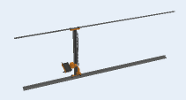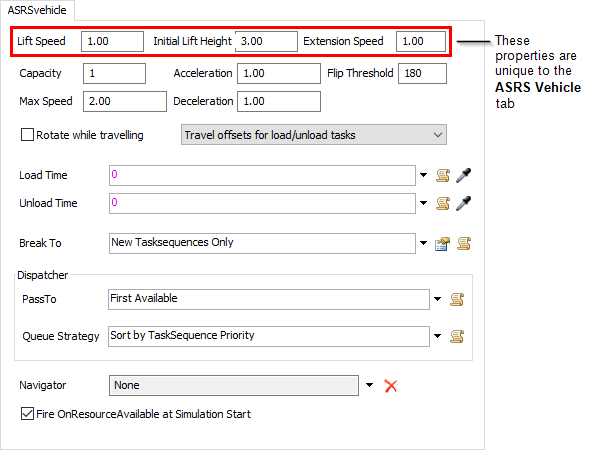ASRS Vehicle
Overview and Key Concepts
The ASRS vehicle is a special type of transport specifically designed to work with racks. The ASRS vehicle will slide back and forth in an aisle between two racks picking up and dropping off flow items. The reach, lift, and travel motions are fully animated by the ASRS vehicle. The lift and travel motions will occur simultaneously, but the reach will only occur after the vehicle has come to a complete stop.

The ASRS vehicle is task executer. It implements offset travel by only travelling along its own x-axis. It travels until it is perpendicular with the destination location, lifting its platform as well. If the offset travel is for a load or unload task, then once the offsetting is finished, it will use the user-specified load/unload time to convey the flow item onto its platform, or off of its platform to the destination location.
The ASRS vehicle does not connect itself to a navigator by default. This means that travel tasks will not be performed. Instead, all traveling is done using offset travel.
In addition to the standard task executer fields, the ASRS vehicle has a modeler-defined lift speed and initial lift position for the its platform. The platform will return to this position whenever the ASRS vehicle is idle or is not doing offset travel.
Context
Since the main distinction of an ASRS vehicle is that it only moves along its x and z axes and doesn't rotate, this object can be used for any purpose in which you don't want the object to turn, but rather just go forward and backward and up and down. In some models it has been used as a simple transfer car, or as a transfer conveyor between two or more conveyors.
Events
The ASRS vehicle uses the standard events that are common to all task executers. See Task Executer Concepts - Events for an explanation of these events.
States
This object uses the task executer states. See Task Executer Concepts - States for more information.
Statistics
The ASRS vehicle uses the standard statistics that are common to all task executers. See Task Executer Concepts - Statistics for an explanation of these statistics.
Properties
The ASRS vehicle object has six tabs with various properties. The last five tabs are the standard tabs that are common to all task executers (except the dispatcher). For more information about the properties on those tabs, see:
Only the ASRS Vehicle tab is unique to the ASRS vehicle object. However, most of the properties on this tab are the same as the properties on The Task Executer Tab. Only the first three properties are unique to the ASRS Vehicle tab.

The following sections will explain these three properties:
Lift Speed
This number is how fast the lift on the ASRS vehicle moves up and down.
Initial Lift Height
This number defines the reset z location of the ASRS vehicle's platform. The platform returns to this height when the model resets. It also returns to this height when it is not traveling the offset of a load/unload task.
Extension Speed
This number controls how fast the extender of the ASRS vehicle moves when transporting flow items.
All Other Properties
See The Task Executer Tab for an explanation of the remaining properties.